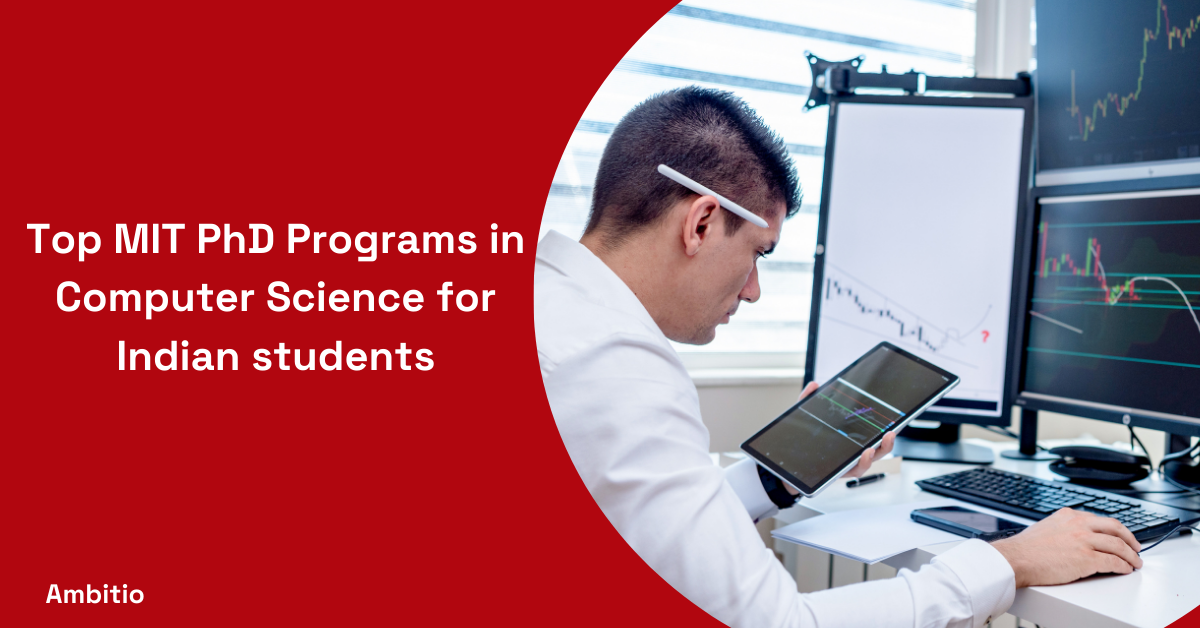26 April 2025
6 minutes read
Top MIT PhD Programs in Computer Science for Indian students

Key Takeaways:
- MIT PhD programs computer science offer specialized tracks in computational science and engineering, helping students excel in their field.
- Indian students can access a range of financial aid options, including fellowships and assistantships, to support their studies.
- A strong application, emphasizing research interests and academic achievements, is crucial for success in MIT’s competitive PhD admissions.
MIT PhD programs in computer science are among the most prestigious and sought-after globally, particularly for Indian students aiming to specialize in computational science and engineering. However, the admissions process is highly competitive, with countless applicants vying for a limited number of spots in MIT’s doctoral programs in computational science. Indian students often struggle with standing out due to the rigorous requirements and intense global competition.
The solution lies in understanding the program’s structure and strategically tailoring your application. Massachusetts Institute of Technology (MIT) CCSE offers specialized tracks, allowing students to focus on cutting-edge computational approaches in science and engineering. With the right preparation, Indian students can excel in MIT’s interdisciplinary doctoral programs, setting themselves up for success in computational science, engineering, and the broader academic and professional landscape.
Why Indian Students Should Consider MIT’s PhD Programs in Computer Science?
Indian students should consider MIT’s PhD programs in computer science for their unparalleled opportunity to specialize at the doctoral level in computation-related fields. MIT’s School of Engineering, particularly the Department of Electrical Engineering and Computer Science (EECS), offers two interdisciplinary doctoral programs that allow students to explore methodological and areas of computational science. Through focused coursework and a doctoral thesis, students can tackle cutting-edge challenges in computational science and engineering.

MIT’s CCSE graduate programs are designed for students to specialize in specific engineering or science disciplines, such as mechanical engineering, electrical engineering, and computer science. With a degree in CSE awarded by CCSE, students engage in solving complex science and engineering problems through computational approaches. The doctoral program is intended for those aiming to make a significant impact in their field, offering resources from MIT’s Schwarzman College of Computing and a collaborative environment across departments.
Admission Requirements for Indian Students in MIT Computer Science PhD Programs
Admission to MIT’s PhD programs in computer science is highly competitive, especially for Indian students seeking a doctoral degree in a computation-related field. The process demands a combination of academic excellence, relevant experience, and a clear research focus. Here’s an overview of the key requirements for Indian students applying to MIT’s doctoral programs in computational science and engineering (CSE):
- Graduate Admission Application: All applicants must submit an application through the Office of Graduate Education. This includes a completed form, transcripts, and letters of recommendation.
- Research Interests: MIT’s CSE PhD program is intended for students who want to specialize at the doctoral level, focusing on computational science via interdisciplinary approaches to science and engineering. A clear research interest aligned with the department’s work is essential.
- Academic Background: A strong academic background in engineering or science is crucial. Applicants should have completed a graduate degree (like an SM program) or MS in Computer Science or equivalent in a related field, such as electrical engineering, mechanical engineering, or computer science.
- Test Scores: While MIT does not require the GRE for the CSE PhD program, applicants must demonstrate their proficiency in computational approaches to science through their academic and research records. The Candidate should require a specific GPA needed to get into MIT
- Research Experience: Experience in computational science, either through research projects, internships, or a thesis, is strongly encouraged. MIT’s doctoral programs focus on the development of new computational methods and application of state-of-the-art computational science.
- Recommendation Letters: At least three letters of recommendation from professors or professionals who can attest to your potential as a graduate student in computational science and engineering.
- Statement of Purpose: Applicants must submit a well-crafted statement of purpose, outlining their motivation for pursuing the MIT doctoral program, career goals, and how they plan to contribute to the CSE field.
- Degree Awarded: Upon completion of the program, a doctoral degree in CSE is awarded by CCSE (Center for Computational Science and Engineering), reflecting the interdisciplinary nature of the program and its focus on computation-related fields.
For Indian students aiming to join MIT’s PhD programs in computer science, this is the essential roadmap to ensure a competitive application to the department’s CSE PhD, which is a standalone program offered entirely by CCSE.
Research Opportunities at MIT for Indian PhD Candidates in Computer Science
MIT offers exceptional research opportunities for Indian PhD candidates in computer science, especially through its CCSE (Center for Computational Science and Engineering) and the Department of Electrical Engineering and Computer Science (EECS). The MIT PhD programs in computer science provide an interdisciplinary approach, allowing students to specialize at the doctoral level in computational science, engineering, and other computation-related fields.
Indian students applying to MIT’s standalone CSE PhD program will engage in cutting-edge research that tackles cross-cutting methodological aspects of computational science. Research topics include developing new computational methods, advancing computational approaches in science and engineering, and focusing on computation within a specific engineering or science context. Focused coursework and a doctoral thesis are expected, with the resulting doctoral degree in computational science awarded by MIT CCSE.

MIT’s interdisciplinary CSE PhD program allows students to engage with the school of engineering, school of science, and other participating departments in the school, enhancing their exposure to a broad range of computational applications. This approach makes MIT’s programs unique, offering flexibility and an opportunity to specialize in computational science while solving real-world challenges in various engineering and science domains. Whether through a graduate subject or thesis work, students will contribute significantly to the development of applicable computational approaches and science-based solutions that advance the field.
Financial Aid and Scholarships for Indian Students Pursuing a PhD in Computer Science at MIT
Indian students looking to pursue a PhD in Computer Science (CSE) at MIT have access to a range of financial aid and scholarships for International students. MIT offers two main doctoral programs in computational science: the interdisciplinary PhD in computational science and engineering (CCSE) and the standalone PhD in CSE offered entirely by MIT EECS. Both programs provide a comprehensive course of study comprising focused coursework and a thesis. The degree is awarded by CCSE or MIT’s Department of Electrical Engineering and Computer Science (EECS), depending on the program chosen.
PhD students can apply to either CSE SM program or the Dept-CSE PhD, with the goal of advancing computational science and contributing to broadly applicable computational approaches. Financial aid plays an essential role in enabling students to focus on their studies without the burden of excessive financial strain. Below is an overview of financial aid options available for Indian students.
| Financial Aid/Scholarship | Description | Eligibility Criteria | How to Apply |
|---|---|---|---|
| MIT Graduate Fellowships | Full financial support covering tuition, fees, and a stipend for living expenses. Awarded to outstanding PhD candidates in computational science and engineering. | Indian students applying to MIT PhD programs in computer science (Dept-CSE or interdisciplinary CCSE PhD). | Apply as part of the PhD application through the MIT admissions portal. |
| Research Assistantships (RA) | Provides financial aid in exchange for research work. RA positions are typically awarded to PhD students in CSE and other related fields. | Applicants must apply for a research assistant position in their specific field of study. | Contact faculty members or department heads to inquire about available RA opportunities. |
| Teaching Assistantships (TA) | Financial support for students who assist in teaching undergraduate courses. Offers partial or full tuition coverage. | Indian students admitted to PhD programs in computational science and engineering. | Apply via the department’s TA application process once admitted. |
| External Scholarships | Various scholarships such as the Tata Scholarship, Inlaks Scholarship, and Shiv Nadar Foundation Scholarship may cover part of the costs for international students. | Indian students with outstanding academic records and leadership potential. | Apply through the respective scholarship organizations before applying to MIT. |
| CCSE Doctoral Program Fellowships | A specialized fellowship for students enrolled in the CCSE PhD program that supports research and development in computational science. | Admission to CCSE’s doctoral programs and research interests aligned with the program’s focus areas. | Part of the PhD program application process at MIT. |
Conclusion
MIT PhD programs in computer science offer unparalleled opportunities for Indian students to advance in the field of computational science and engineering. With extensive financial aid options, including fellowships, assistantships, and external scholarships, MIT ensures that financial constraints don’t hinder academic success. Indian students aspiring to join these prestigious programs can benefit from comprehensive support systems and cutting-edge research opportunities.
For personalized guidance on your application journey, trust Ambitio to help you navigate the process with expert insights and strategies. Start your application today with Ambitio Elite and unlock your future at MIT!
FAQs
What is the focus of the MIT PhD program in Computational Science and Engineering?
The program focuses on developing expertise in computational methods and their application in science and engineering disciplines.
What are the admission requirements for the MIT CSE PhD program?
Applicants must have a strong academic background in engineering or a related field, along with research experience and a demonstrated aptitude for computational science.
Does the program offer opportunities for interdisciplinary studies?
Yes, the program encourages interdisciplinary studies, allowing students to explore computational approaches across different scientific and engineering disciplines.
What degree is awarded upon completion of the program?
Graduates are awarded a Doctor of Philosophy (PhD) in Computational Science and Engineering.
What are the main MIT PhD programs related to Computer Science?
MIT offers PhD programs in Electrical Engineering and Computer Science (EECS) and Computational Science and Engineering (CSE).
What is the curriculum structure and research focus?
The program includes core courses, electives, and intensive research in areas like AI, theory, and systems.
Can I transfer credits or join the program if I already hold a PhD?
No, MIT EECS does not accept transfer credits, and those with a prior PhD are not eligible.

You can study at top universities worldwide!
Get expert tips and tricks to get into top universities with a free expert session.
Book Your Free 30-Minute Session Now! Book a call now




























